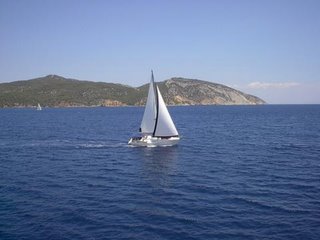
"Beware the Ides of March!" Many people will playfully tout this warning today without being completely aware of what they are saying. We owe the popularity of this phrase not to Julius Caesar or any other ancient Roman, but to a man who lived over 1600 years later -- the venerated William Shakespeare.
In Act I, Scene ii in
Julius Caesar, Shakespeare writes,
Caesar:
Who is it in the press that calls on me?
I hear a tongue shriller than all the music
Cry Caesar. Speak; Caesar is turned to hear.
Soothsayer:
Beware the ides of March.
Caesar:
What man is that?
Brutus:
A soothsayer bids you beware the ides of March.
Caesar:
Set him before me, let me see his face.
Cassius:
Fellow, come from the throng, look upon Caesar.
Caesar:
What sayest thou to me now? Speak once again.
Soothsayer:
Beware the ides of March.
Caesar:
He is a dreamer, let us leave him. Pass.
Shakespeare has the soothsayer warn Caesar of the Ides; and Caesar chooses not to heed this warning because he could not or would not live his life in fear. In Act II, Scene ii, when Calpurnia begs him to stay home from the meeting of the Senate scheduled for the Ides, Caesar refuses to heed his wife and utters his immortal phrase,
Cowards die many times before their deaths,
The valiant never taste of death but once.
And later in Act III, Scene i, Caesar comes across the soothsayer on the way to the meeting of the Senate,
Caesar:
The ides of March are come.
Soothsayer:
Ay Caesar, but not gone.
Since the time of Shakespeare's play (1599), the phrase "Beware the Ides of March!" has become the work's popular legacy and, when used in modern context, has come to mean, "Open your eyes and look at what is happening! Pay attention to what's going on around you or bad things are going to happen! Don't say we didn't warn you!"
A side effect of the whole Ides of March pronouncement is the common notion that the Ides fall on the 15th of every month. Indeed, many believe that another bloody Ides comes a month later with the annual deadline for filing income taxes in April. In reality, the Ides fall on the 13th of every month with the exception of March, May, July, and October.
Next, we come to the discussion of Julius Caesar's dying words. Plutarch writes that Caesar said nothing, but simply pulled his toga over his head at the sight of Brutus (Parallel Lives: The Life of Julius Caesar, 66.12). Suetonius (De Vita Caesarum LXXXII) states that Caesar's last words, aimed at Brutus, were in Greek "Kai su, teknon?" ("You too, son?"). Again, our experience with this event comes from Shakespeare who makes Caesar's last gasp the popular, "Et tu, Brute?" ("Even you, Brutus?"). This phrase, in both ancient and modern context, has come to represent an expression of surprise or disappointment that someone is a part of something you never would have expected. You have been betrayed!
Finally, I have seen numerous versions of Shakespeare's Julius Caesar, some of them very good and some barely memorable. The best death scene, though, comes from a production I saw several years ago at the Shenandoah Shakespeare Black Friar's Theater in Staunton, Virginia. Caesar enters the Senate triumphantly, sporting a regal, red sash around his white, tailored suit. He climbs the stairs to the seat and is, in due course, murdered. As he dies, he falls down the stairs, unwinding his sash as he rolls, leaving behind a trail of blood.
It is interesting how great an effect the literature of Shakespeare has had upon our understanding and memory of historical events.
 This is a picture of the tumbled columns from the Temple of Zeus in Olympia, Greece. It was taken by a student (Kimberly A.) on our trip in 2004.
This is a picture of the tumbled columns from the Temple of Zeus in Olympia, Greece. It was taken by a student (Kimberly A.) on our trip in 2004.


 It seems there is a living history event called
It seems there is a living history event called 

